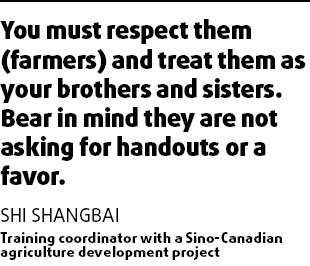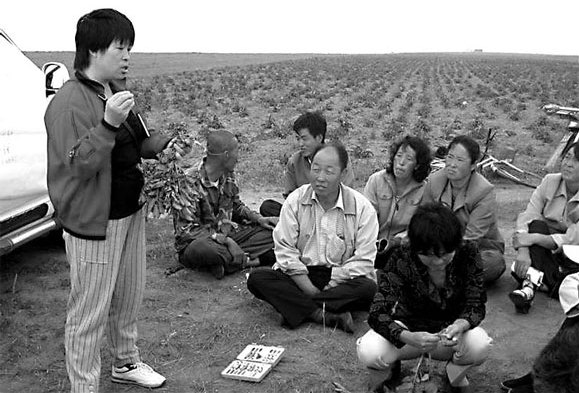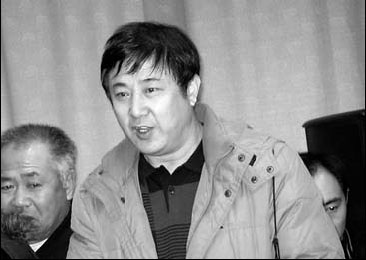Planting good ideas
|
A farmer field school in Wuchuan, Inner Mongolia autonomous region. Liu Tong |
Teacher Shi Shangbai's lessons could come straight out of the Central Academy of Drama. The stage is set in a classroom, which is located on a sheep farm in Beijing's northern suburbs. He asks one student to lie down on her side on a large piece of white paper and then instructs one of her classmates to bend over, and using a crayon, draw an outline of her torso.
After she rises off the ground, other students are asked to mark the different body parts on the sketch.
The exaggerated and sometimes ill-proportioned drawings make everyone burst into laughter.
But what Shi wants his students to learn from this game goes far beyond amusement.
In his Farmer Field School (FFS) class Shi demonstrates to some 30 extension workers, farmers and herdsmen from across the country, how the "participatory teaching method" works.
He hopes his farmer-instructor students can apply this method when training their fellow farmers at field schools across the nation.

At these field schools, farmers raise many different types of problems. Herdsmen have cattle feeding concerns, pig farmers are worried over the small size of their livestock and vegetables growers may be fighting some new strain of plant disease.
The FFS officers have the latest information about these issues, but sometimes communicating these ideas is the biggest hurdle.
In the participatory method farmers are not only participants, but also teachers. They are encouraged to share ideas, take the initiative to identify problems and find solutions.
The method has been promoted since the late 1980s, when the United Nations Food and Agriculture Organization (FAO) trialed the first Asian programs, initially in Indonesia.
The group-based program uses a field as the primary learning venue so that farmers learn by themselves the various activities that best suit their immediate needs.
Shi, a training coordinator with a Sino-Canadian agriculture development project, is a pioneer of the method in China.
He has 21 years' experience in farmer field school training and is also IPM (Integrated Pest Management) expert. So far he has trained more than 1,000 extension workers and farmers.
Simply dressed and a man of few words outside the classroom, Shi appears and behaves more like a farmer than an FFS trainer with a PhD degree in ecology from Beijing Normal University.
But when he talks about FFS and his training courses, he becomes passionate and philosophical.
When dealing with farmers, "respect is the key", he says.
"You must respect them and treat them as your brothers and sisters. Bear in mind they are not asking for handouts or a favor."
His advice to the extension workers, researchers and even government officials: never be condescending. Only then can farmers be engaged as part of the program, Shi says.
A sense of respect and equality is what Shi has been trying hard to get through to his students.
"Each time I finish my lecture, I ask my students, 'have I made myself understood?' I never ask 'do you understand?' which carries more or less a sense of superiority," he says.
In his class, students - with different educational backgrounds and work experiences - are usually shy and reluctant to talk at first.
To set the ball rolling, Shi asks them to draw pictures that best reflect their personality, and explain what the picture means to the whole class. "In education, you need to treat adults as children and children as adults," says Shi, who attended extensive pedagogical courses during his doctoral study.
To get every students involved, he asks them to discuss and set rules for the class, such as when to take a break and when to hold class discussions.
"The students are far more imaginative than most would think," he says. As an example, he mentioned the 20-yuan ($3) fine they decided to levy on anybody leaving a mobile phone on during class.
"After a few students were fined on the first day, there has been no cell phone ringing in my class."
This is exactly what a participatory method meant to achieve, he says.
Games are a vital to drive home Shi's point.
|
Shi Shangbai at an FFS training course.Huang Xiangyang |
One game students play features blindfolds, string, a chopstick and an empty bottle. Four students face each other in a square formation and string connects the opposing players around their waists. A chopstick is attached to the crisscross section and students must lower the downward pointing chopstick into the empty bottle. An observer instructs the participants on how to adjust their position so that together they can achieve the task. It is not easy. But one by one, the blindfolds are removed and the task becomes much easier.
The lesson learnt: Transparency raises efficiency. And it is the leader's responsibility to let everyone involved in a task be updated with the latest progress throughout the course.
When Shi talks to the students, he uses eye contact. When he listens, he does it attentively with a smile. After a student finishes a speech, he never hesitates to find its merits, and praise him or her profusely.
He says that subconsciously his students will learn to treat farmers and other people the same way. This positive approach is the gist of his training course.
But the method, considered revolutionary when introduced nearly two decades ago, is still new in China, where farm technology dissemination is still often done by the traditional one-way, forced-feeding method without considering farmers' specific needs, according to Shi.
"The conventional thinking presumes that farmers don't know much about farming technology, and they will follow whatever agriculture experts or extension workers tell them to do," Shi says. "But it is not true."
Farmers are selective in their learning. They only embrace what they think can bring them tangible benefits.
And it is the trainer's responsibility to identify their needs through all means, like the participatory method, he says.
Shi admits it may not be easy for the students to adapt to this new way of thinking.
"Everyone is subject to the shackles of the old mindset. As students tend to think teachers must know everything, farmers tend to think that extension workers must know more than they do," he says.
"But with the participatory method we seek to break that mindset so that farmers can turn themselves from passive recipients of knowledge into active learners."
Duan Weide, a farmer from Inner Mongolia, has twice attended the course given by Shi. He organized his first farmer field school on potato planting in his hometown last August using what he had learned from the training.
"The participatory method shortens the psychological distance between farmers, and makes them eager to share with others the good method in farming," Duan says.
More farmers are showing interest in farmer field schools because they "cater to their needs", he adds.
But Qi Xiaomei, an extension worker from Gansu province who works with herdsmen, feels the pressure.
"The herdsmen, after attending farmer field schools, have so many questions to ask. If you don't give them good answers, they start to doubt your ability. I have to keep learning."
That is what Shi has always encouraged his students to do.
"Actually I benefit most from the training." Shi says. "I have learned so much from my students".
(China Daily 04/22/2008 page20)
















